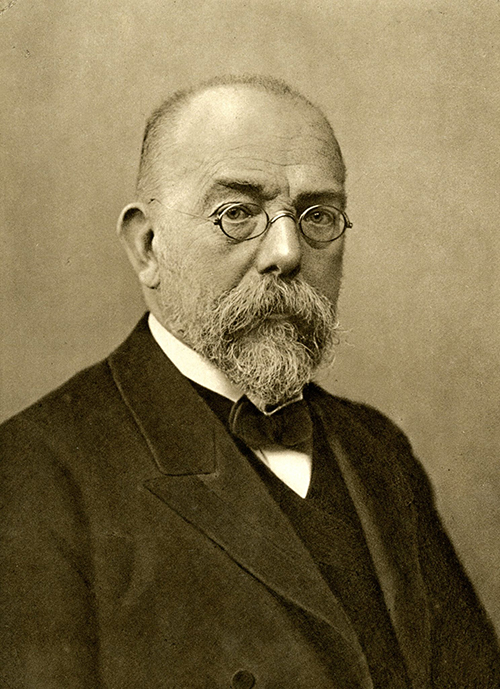Die aetiologie der tuberculose. Berlin: August Hirschwald, 1882.
Untersuchungen über die aetiologie der wunderinfectionskrankheiten. Leipzig: F. C. W. Vogel, 1878.
 Robert Koch, another pioneer in the fields of bacteriology and microbiology, was as instrumental as Pasteur in confirming the germ theory of disease. A native of Klausthal, Germany, Koch received his degree in medicine from the University of Gottingen in 1866. After serving as an army surgeon in the Franco-Prussian War, he became district physician in Wollstein. This was an active lifestyle, but Koch still found time for his great interest in microscopy. While in Wollstein, he concentrated his extracurricular studies on anthrax, and in 1876, gained recognition in the medical community for tracing the life history of the anthrax bacillus and discovering this bacterium as the cause of the disease (Garrison 578). In the following years, he focused much of his attention on wound and surgical infections, and the resulting publication was Untersuchungen über die aetiologie der wunderinfectionskrankheiten (Investigations into the etiology of traumatic infective diseases). Here, Koch differentiates between six types of bacterial infections, identifies their specific characteristics, maintains the distinct infections through several generations, and displays the role of bacteria in causing wound infections. He established the fact that four criteria must be met before designating a bacterium the cause of infection. These postulates, which later came to be known as “Koch’s postulates”, are first stated in this work (Garrison & Morton 2536). Still applicable to the study of disease etiology today, the requirements are that “the organism must (1) be found in every case; (2) be isolated and grown in pure culture; (3) produce the same disease when injected into animals; (4) be recovered in all experimental cases” (Duffin 81). The postulates, along with Koch’s demonstration of bacteria capable of passing this test, were finally able to convince the medical community of Pasteur’s germ theory.
Robert Koch, another pioneer in the fields of bacteriology and microbiology, was as instrumental as Pasteur in confirming the germ theory of disease. A native of Klausthal, Germany, Koch received his degree in medicine from the University of Gottingen in 1866. After serving as an army surgeon in the Franco-Prussian War, he became district physician in Wollstein. This was an active lifestyle, but Koch still found time for his great interest in microscopy. While in Wollstein, he concentrated his extracurricular studies on anthrax, and in 1876, gained recognition in the medical community for tracing the life history of the anthrax bacillus and discovering this bacterium as the cause of the disease (Garrison 578). In the following years, he focused much of his attention on wound and surgical infections, and the resulting publication was Untersuchungen über die aetiologie der wunderinfectionskrankheiten (Investigations into the etiology of traumatic infective diseases). Here, Koch differentiates between six types of bacterial infections, identifies their specific characteristics, maintains the distinct infections through several generations, and displays the role of bacteria in causing wound infections. He established the fact that four criteria must be met before designating a bacterium the cause of infection. These postulates, which later came to be known as “Koch’s postulates”, are first stated in this work (Garrison & Morton 2536). Still applicable to the study of disease etiology today, the requirements are that “the organism must (1) be found in every case; (2) be isolated and grown in pure culture; (3) produce the same disease when injected into animals; (4) be recovered in all experimental cases” (Duffin 81). The postulates, along with Koch’s demonstration of bacteria capable of passing this test, were finally able to convince the medical community of Pasteur’s germ theory.
Koch eventually held posts at such institutions as the Imperial Health Department, the University of Berlin, and the Institute for Infectious Diseases. During his lifetime, he continued to advance the study of bacteriology by developing new microscopy techniques for photographing, culturing, dying and staining bacteria. In 1882, he used these perfected techniques to help identify the bacteria causing pulmonary tuberculosis. This revelation helped control the spread of tuberculosis by turning attention to the true cause instead of the formerly dominant theory of inadequate nutrition (Heirs of Hippocrates 1075). In 1905, Koch received the Nobel Prize for this beneficial discovery. His paper on the subject, Die aetiologie der tuberculose, is also held in the Reynolds-Finley Historical Library. Though it is a short ten-page article from the journal Berliner klinische Wochenschrift, it is one of Koch’s most appreciated works.
Cambridge Illus. Hist. Med.,184; Duffin, Hist. of Med., pp. 81, 157; Garrison, Hist. of Med. 4th Edition, p. 578-580; Garrison & Morton, Med. Bib., 5th Edition, 2536; Heirs of Hippocrates, 1075; One Hund. Books, p. 80; Oxford Comp. to Med., Vol. I, p. 636; Reynolds Historical Library, Rare books and coll., 2333 & 2336.
Image: Robert Koch, Print Collection, Reynolds-Finley Historical Library.
